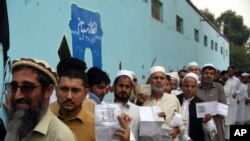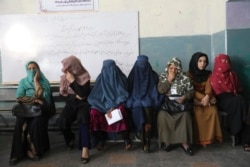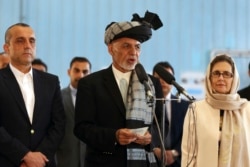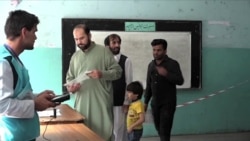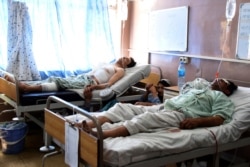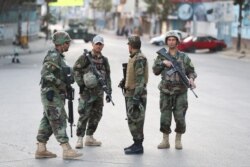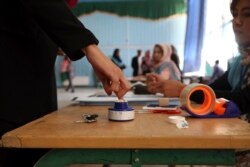Afghans headed to the polls Saturday to elect a new president amid fears that voter turnout would be badly hit by disorganized balloting and threats of violence by Taliban militants, who targeted polling stations in the country’s north and south, causing dozens of casualties.
An upsurge in violence in the run-up to the elections, following the collapse of U.S.-Taliban talks to end America’s longest war, had rattled Afghanistan in the past weeks. Yet Saturday, many voters expressed equal fear and frustration over relentless government corruption and the widespread chaos at polling stations.
In the capital of Kabul, turnout was sporadic and in the morning hours it was rare to see a crowded polling center. No early figures on voter turnout were immediately available. Afghans who had patiently lined up before the voting centers were opened, entered in some locations to find that election officials had yet to arrive by opening time.
Imam Baksh, who works as a security guard, said he wasn’t worried about his safety as he stood waiting to mark his ballot, wondering whom he would vote for.
“All of them have been so disappointing for our country,” he said.
The leading contenders are incumbent President Ashraf Ghani and his partner in the five-year-old unity government, Abdullah Abdullah, who already alleges power abuse by his opponent. Cameras crowded both men as they cast their vote earlier in Kabul, with Ghani telling voters they too had a responsibility to call out instances of fraud.
Controversial election
The government’s push to hold the vote was in itself controversial. In an interview with The Associated Press last week, former Afghan president Hamid Karzai, who still wields heavy influence, warned that the vote could be destabilizing for the country at a time of deep political uncertainty and hinder restarting the peace process with the Taliban.
On Saturday, one of the first reports of violence came from southern Afghanistan, the former spiritual heartland of the Taliban. A bomb attack on a local mosque where a polling station was located wounded 15 people, a doctor at the main hospital in the city of Kandahar said. The doctor spoke on condition of anonymity because he was not authorized to speak with the media.
The wounded included a police officer and several election officials, along with voters. Three were in critical condition.
In northern Kunduz, where Taliban have previously threatened the city — even briefly taking control of some areas — insurgents fired mortar rounds into the city and attacked Afghan security forces on its outskirts, said Ghulam Rabani Rabani, a council member for the province.
Rabani said the attacks are to “frighten people and force them to stay in their home and not participate in the election.”
The numbers of casualties wasn’t immediately clear, said Rabani, with telecommunication networks disrupted or even completely down at times.
Widespread security
Tens of thousands of police, intelligence officials and Afghan National Army personnel have been deployed throughout the country to protect the 4,942 election centers. Authorities said 431 polling centers will stay closed because it was impossible to guarantee their security since they were either in areas under Taliban control or where insurgents could threaten nearby villages.
The violence came while many Afghans, even those managing to vote, worried the election results would be overwhelmed by accusations of fraud and misconduct as they were during the last election.
In the capital’s northern Taimani neighborhood of mostly ethnic Hazaras, two-thirds of the voting registration papers had yet to arrive in the first hours of voting, and angry voters were told their names were not on the list.
Abdul Ghafoor, who spoke on behalf of dozens of men waiting to cast their ballot, said that of about 3,000 registered voters, only 400 appeared on the list that had arrived at the center.
Ghafoor said he was told to return at 2 p.m. and that he would be allowed to vote even if his name was not on the list and without using the biometric machine.
“But how can they do this? My vote won’t count if I am not on a list,” he said.
In Khoja Ali Mohfaq Herawi mosque in Kabul’s well-to-do Shahr-e-Now neighborhood, election workers struggled with biometric machines as well as finding names on voters’ lists.
Ahmad Shah, 32, cast his vote, but said the election worker forgot to ink his finger, which is mandatory to prevent multiple voting by the same person.
“What sort of system is this?” he asked, frustrated that he had risked his safety to vote and expressed fear that fraud will mar the election results. “It’s a mess.”
Still, 63-year old Ahmad Khan urged people to vote.
“It is the only way to show the Taliban we are not afraid of them,” he said, though he too worried at the apparent glitches in the process.
Neighboring Pakistan, routinely accused of aiding insurgents, said it was re-opening its borders with Afghanistan after receiving a request from the Afghan defense minister to allow Afghans to return home to vote. Pakistan had announced the border would be closed Saturday and Sunday.




